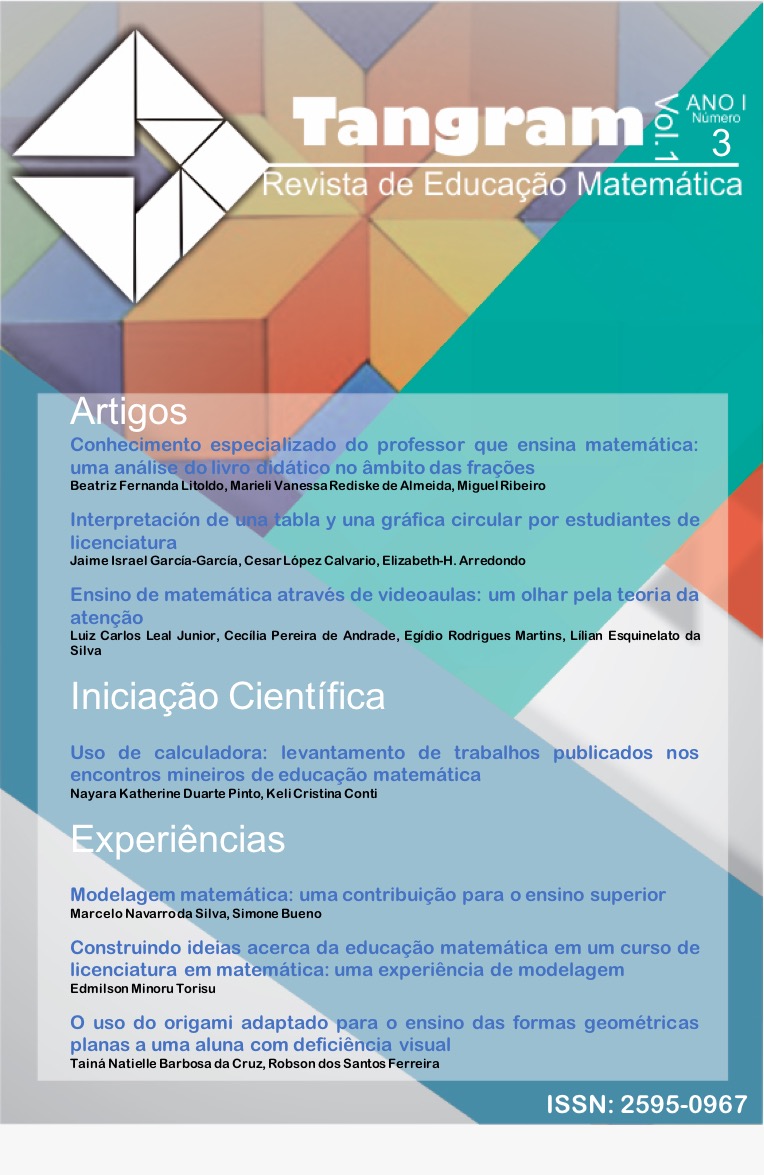Ensino de Matemática através de Videoaulas: Um olhar pela Teoria da Atenção
DOI:
https://doi.org/10.30612/tangram.v1i3.8300Abstract
É crescente o número de estudantes que têm recorrido às videoaulas dispostas em redes sociais. Muito disso é devido ao desmantelamento dos modos de ensino enciclopédicos vigentes em nossas escolas e da falta de atenção dos estudantes ao ensino tradicional. Por meio de uma Análise de Discurso arqueogenealógica procuramos compreender e tensionar os mecanismos que se colocam como propulsores dessa nova forma de se ensinar e aprender matemática da atualidade. Trata-se de um recorte de nosso projeto de pesquisa atual, onde vinculamos e analisamos seus efeitos nesse meio inovador sob um olhar da Teoria da Atenção, a qual nos apresenta alguns fatores condizentes e fundamentais pelo qual tantos alunos quanto professores virtuais vêm a procurar e trabalhar nesse ambiente.
Downloads
References
Cocchieri, T.; & Moraes, J. A.(2009). Uma perspectiva pragmática da lógica da descoberta e da criatividade. COGNITIO-ESTUDOS: Revista Eletrônica de Filosofia, São Paulo, v. 6, n. 1, p. 8-14, Jul. Disponível em: <http://www.pucsp.br/pos/filosofia/Pragmatismo>.
Cohen, A. (2003). Selective Attention. In: NADEL (Org.). Encyclopedia of Cognitive Science. Londres: Nature Publishing Group, v.3 p. 1033-1037.
Foneca-Silva, M. C.(2004). Foucault e a arqueogenealogia do sujeito. Sujeito, identidade e memória, Uberlândia, p. 27-69.
Foucault, M.(2014). A Ordem do Discurso. 24. ed. São Paulo: Loyola Ed., 78 p.
Foucault, M. (1996). Microfísica do Poder. Tradução de Roberto Machado. 12. ed. Rio de Janeiro: Graal.
Foucault, M.(2015). Arqueologia do Saber.8. ed. Rio de Janeiro: Forense Universitária Ed.,
James, W.(1980). The Principles of Psychology. Nova iorque: Dover Ed., Vol. 1.
Leal Junior, L. C.; & Onuchic, L. R. (2015) Ensino e Aprendizagem de Matemática Através da Resolução de Problemas Como Prática Sociointeracionista. Bolema: Boletim de Educação Matemática, v. 29, n. 53, p. 955-978. Disponível em: <http://www.redalyc.org/html/2912/291243162010/>.
Onuchic, L. R.; & Leal Junior, L. C. (2016). A Influência da Leitura na Resolução de Problemas: Questões de sentidos, significados, interesses e motivações. REMATEC - Revista de Matemática, Ensino e Cultura, v. 11, n. 21, p. 23.
Onuchic, L. R.; Leal Junior, L. C.; & Pironel, M.(2017). Perspectivas para Resolução de Problemas. 1. ed. São Paulo: Livraria da Física.
Reisberg, D.; & Mayer, R. E. (2013). Problem Solving. In: MAYER, R. (Org.). The Oxford Handbook of Cognitive Psychology. Oxford: Oxford University Press, 2013.
Rodrigues, R.; Veloso, A.; & Mealha, O. (2013). A dispersão multimodal na visualização de Noticiários Televisivos. In: COMUNICAÇÃO, S. A. P. D. C. D., 8º SOPCOM: Comunicação Global, Cultura e Tecnologia, 2013, Lisboa. p. 586-591.
Downloads
Published
How to Cite
Issue
Section
License
Authors must accept the publication rules when submitting the journal, as well as agree to the following terms:
(a) The Editorial Board reserves the right to make changes to the Portuguese language in the originals to maintain the cultured standard of the language, while respecting the style of the authors.
(b) Authors retain the copyright and grant the journal the right to first publication, with the work simultaneously licensed under the Attribution-NonCommercial-ShareAlike 3.0 Brazil (CC BY-NC-SA 3.0 BR) that allows: Share - copy and redistribute the material in any medium or format and Adapt - remix, transform, and create from the material. CC BY-NC-SA 3.0 BR considers the following terms:
- Attribution - You must give the appropriate credit, provide a link to the license and indicate whether changes have been made. You must do so under any reasonable circumstances, but in no way that would suggest that the licensor supports you or your use.
- NonCommercial - You may not use the material for commercial purposes.
- Sharing - If you remix, transform, or create from material, you must distribute your contributions under the same license as the original.
- No additional restrictions - You may not apply legal terms or technological measures that legally restrict others from doing anything that the license permits.
(c) After publication, authors are allowed and encouraged to publish and distribute their work online - in institutional repositories, personal page, social network or other scientific dissemination sites, as long as the publication is not for commercial purposes.






